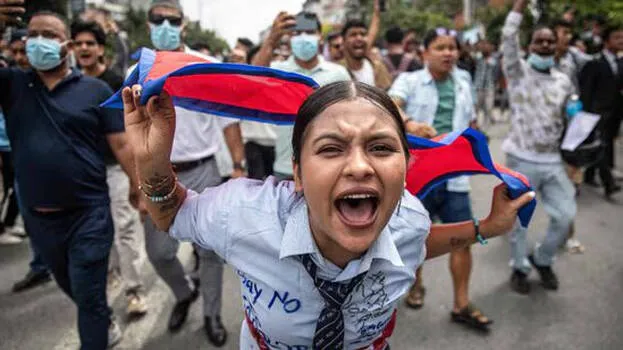

Elected governments falling to the ground in the face of youth protests is a phenomenon that has been repeated many times around the world. The most recent example is Nepal. A barely three-day protest ousted communist Prime Minister K.P. Sharma Oli. He fled to Dubai. The parliament building is the greatest symbol of a democratic government in any country. When the protesters set it on fire, the whole world realized that the democratic government in Nepal had become ashes. Those who accuse the US of being behind the coup are carrying out a campaign similar to covering the sun with their own hands.
Of course, foreign aid and intervention are natural for such protests. However, one should not forget the subtle reality that the groundwork for it was laid in the respective countries. The agitation was sparked by the Nepalese government's ban on 26 social media platforms such as Facebook, Twitter, and YouTube on September 4, which had not completed the registration process. A harmless question of shouldn't social media platforms circulating in a country suppose to obey the instructions of the government may arise here. However, the government had also put forward a condition that those who register must propagate the government's policies. Nepalese youth had shared the corruption of the government and the embezzlement of ministers and their family members through WhatsApp groups.
The young people who were passing on the messages had reached the conclusion that the unemployment and poverty that prevailed in the country were due to the rampant corruption of the government. It was because the government realised this that they blocked 26 social media platforms at once with the aim of preventing their ugly face from being exposed. The government blocked the avenues for the youth, who were already suffocating, to share with each other their pain, sorrow and anger. It was only when they were thrown in the dark that the youth took to the streets against the corruption, nepotism and embezzlement by the ruling class. This is the situation that any government that lives a life of luxury in ivory towers without understanding the pulse of the people while in power will have to face today, if not tomorrow.
Similar coups took place in Sri Lanka, Bangladesh and Pakistan. The two common factors here were rampant corruption and a severe economic collapse. People took to the streets against Rajapaksa in Sri Lanka when petrol, medicines and food became more expensive. There is no shortage of social media oracles who predict that such an uprising will take place in India next. It must be assumed that they understand geopolitics like blind men visiting an elephant. India has a strong democratic government. There is a very strong defense force that can retaliate the next moment if it is attacked. The level of corruption has decreased compared to the past decades and economic security has improved significantly. On top of all this, there are democratically conscious people in our villages who do not fall for anyone's tricks and distorted propaganda. Therefore, we have nothing to fear except that we should do everything we can to ensure peace in our neighbouring country.